
Lithium is a potent drug that’s used to help people with mood disorders. Since it’s unstable in its elemental form, lithium salts are instead used for the treatment of these conditions. Among these lithium salts, lithium orotate has risen in popularity over the last several years and has become a novel form of treatment for mental health disorders and possesses other health benefits as well.
In this article, we’ll cover what the research says about lithium orotate and review how this supplement can help different conditions including anxiety, depression, and insomnia. We’ll also discuss the potential side effects of lithium orotate and provide information on how to take lithium orotate in order to maximize its benefits while minimizing potential adverse effects.
Finally, we’ll cover in detail what you need to pay close attention to when buying lithium orotate and explain how to find the right lithium orotate on Amazon.
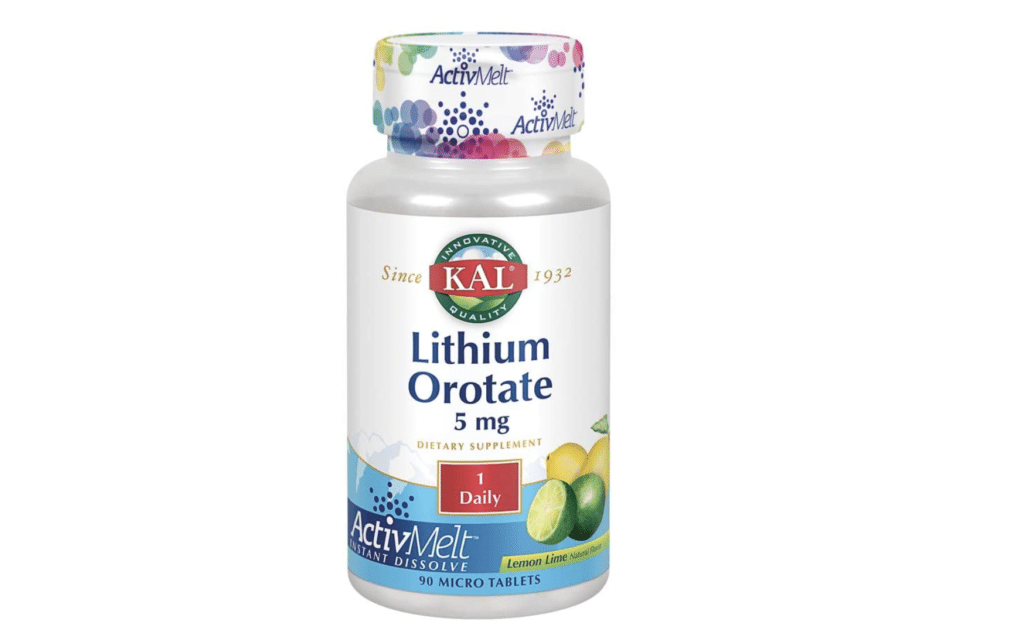
Looking for the best lithium orotate supplement?
KAL offers fast-dissolving lithium orotate micro tablets with 5 mg of elemental lithium and a pleasant lemon-lime flavor.
Lithium Orotate Studies
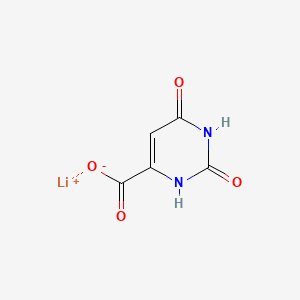
Lithium orotate is composed of elemental lithium and orotic acid. It is a lot less potent than lithium carbonate, which is studied extensively and preferred for bipolar disorder treatment. Even though lithium orotate contains a much lower dose of elemental lithium, people still claim it helps with mood regulation, anxiety, depression, migraines, alcoholism, and other conditions.
However, we need to see solid clinical research to make firm conclusions. Until then, some of lithium orotate’s supposed benefits remain only anecdotal. In addition, the FDA has not approved lithium orotate for any medical use.
Here is what the science currently has to say about lithium orotate’s benefits.
Lithium Orotate For Bipolar Disorder
Current research proposes lithium orotate as a better alternative to treating bipolar disorder than commonly used lithium carbonate. The main reason is that it crosses the blood-brain barrier more easily, requiring a lower dose to work. That could eliminate some of the adverse side effects currently linked with lithium carbonate.
Other researchers propose that supplements such as lithium orotate are a much more sustainable and effective solution for long-term bipolar disorder management.
Lithium Orotate For Sleep
Sleep disturbances and mental health disorders often go hand in hand. That’s why people with bipolar disorder have trouble getting sufficient sleep.
However, a 2016 study discovered that patients with bipolar disorder using lithium as a mood-stabilizing therapy had longer sleep duration and better sleep quality than those not taking lithium. That’s consistent with some of the previous research that determined that lithium has the potential to increase slow-wave sleep.
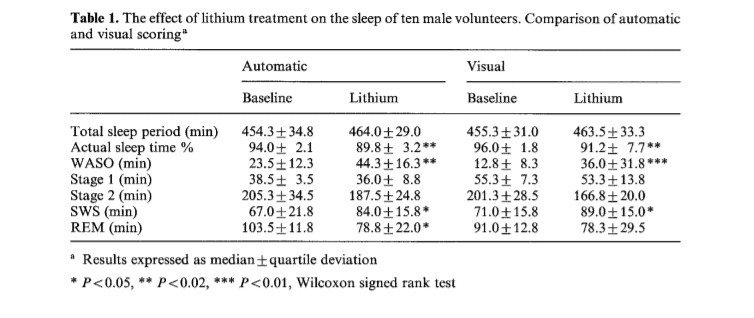
in SWS (slow wave sleep) scored by both automatic sleep stage analysis and
visual scoring. Retrieved from https://tahomaclinic.com/Private/Articles4/Insomnia/Friston%201989%20-%20Lithium%20increases%20slow%20wave%20sleep.pdf
However, we must mention that solid clinical studies examining the effects of lithium orotate on sleep and insomnia symptoms are lacking. Still, many user reviews report that people experience sleep benefits when using these supplements.
Lithium Orotate For Anxiety
Some animal model studies examining the effects of low levels of lithium on the prevention of Alzheimer’s disease found out that mice who were microdosed with lithium exhibited fewer signs of anxiety behavior. Human studies show that lithium can reduce anxiety and other attention deficit hyperactivity disorder (ADHD) symptoms.
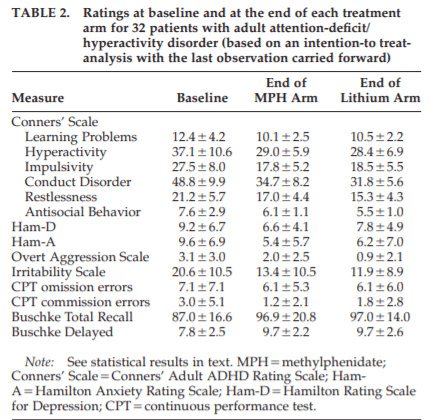
produced similar improvements on the primary
outcome measure and on measures of irritability,
aggressive outbursts, antisocial behavior, anxiety,
and depression. Patients received 8 weeks of MPH treatment (up to
40 mg/day) and 8 weeks of lithium treatment (up
to 1,200 mg/day), by random assignment. Retrieved from https://neuro.psychiatryonline.org/doi/pdf/10.1176/jnp.14.3.289
Research on the direct link between lithium orotate and anxiety is lacking, but many people report this effect during regular supplementation with lithium orotate.
Lithium Orotate For Depression
Lithium orotate benefits include feeling calmer, experiencing fewer and less intense depressive episodes, having rarer suicidal thoughts, feeling less aggressive, and not being as easily upset by internal and external stressors. Although it primarily stabilizes mood during manic episodes in bipolar disorder, lithium orotate could be an excellent way to manage symptoms of depressive episodes.
Lithium may play an essential role in treating unipolar depression, especially in patients with high suicidal risk. Lithium can be an excellent long-term option in managing affective disorders and preventing depressive episodes.
However, we must mention that although lithium orotate may help with symptoms of depression, it is a low-dose option and not an effective clinical treatment. Instead, psychiatrists prescribe lithium carbonate.
Lithium Orotate For Autism
Animal model studies demonstrate that lithium has the potential to alleviate autistic-like behaviors triggered by neonatal isolation in rats. Researchers were curious about lithium’s potential to do the same in humans, which is why some newer studies explore its ability to stabilize mood in adolescents with an autism spectrum disorder. Although the results are positive, and lithium carbonate was an effective and well-tolerated mood-stabilizing alternative, the sample size was relatively small.
More quality studies are needed to determine whether lithium orotate has any significant benefits for people with autism.
Lithium Orotate For OCD
Obsessive-compulsive disorder (OCD) is one of the most common mental health conditions in the world. The first-line treatment includes cognitive-behavioral therapy, which is not always effective. That’s why newer studies focus on lithium’s potential to manage OCD symptoms.
The research highlights lithium’s potential to affect specific pathways vital in controlling oxidative stress, inflammation, and regulating glutamine. All of these things have a significant effect on the onset of OCD, so scientists believe that lithium will be an excellent option for managing the symptoms of this condition.
Lithium Orotate For ADHD
We already mentioned that lithium has the potential to reduce anxiety in people with ADHD. It can also reduce hyperactivity, impulsiveness, cognitive impairment, irritability, antisocial behavior, and other symptoms of ADHD. However, levels of lithium used in these studies are much higher than those found in standard lithium orotate supplements.
Lithium Orotate For Migraines
The use of lithium orotate by alcoholic patients helps them experience fewer or no migraines. Many people report having fewer migraines when using these supplements, but more studies are needed to confirm these claims.
In addition, one review found that using lithium carbonate exacerbated the effects of migraines and cluster headaches, but the doses used were much higher, and the sample sizes were small.
Lithium Orotate For Alcoholism
Lithium orotate proved helpful in the treatment of alcoholism, with a few minor side effects such as loss of appetite, muscle weakness, and mild apathy. The subjects experienced better liver and cardiovascular function, fewer migraines, elimination of seizures, and improved white blood cell count, manic episodes, and hyperthyroid function.
Lithium Orotate For The Prevention Of Cognitive Decline
Small doses of lithium prevent memory loss in mice, which reveals the potential in preventing and treating conditions such as Alzheimer’s disease. These neuroprotective effects are also observed in humans. In fact, a study in older adults showed that long-term treatment for patients with mild cognitive decline prevented further decline and onset of dementia. It also improved biomarkers related to Alzheimer’s disease.

Lithium’s neuroprotective properties could also be beneficial in the treatment of other neurodegenerative conditions such as amyotrophic lateral sclerosis (ALS), Parkinson’s, and Huntington’s disease.
Lithium Orotate Side Effects
A two-year study following people using lithium orotate supplements for various conditions showed that doses under 5 mg of elemental lithium per day are safe and won’t induce side effects. Luckily, most lithium orotate supplements sell in 120 mg capsules, which contain around 4.6 mg of elemental lithium.
Going over this limit, especially over a long period, can make you exhibit classic signs of lithium toxicity, such as nausea, tremors, impaired kidney function, muscle weakness, and reduced thyroid and parathyroid gland functioning.
However, we need to highlight the need for more reliable clinical studies to determine the safety and recommended dose for lithium orotate supplements.
Does Lithium Orotate Affect The Kidneys?
Taking too many lithium orotate supplements can cause lithium toxicity, which can affect the kidneys. Thirst and excessive urination could be one of the first signs of that. That’s why it is essential to follow the recommended intake on your supplement bottle.
A comprehensive two-year study following the people taking low-dose lithium shows that it is safe and does not cause kidney problems.
Does Lithium Orotate Cause Weight Gain?
One of the most common complaints of people taking lithium orotate supplements is weight gain. The same study that found no effect on renal function also reported some side effects, including weight gain.
People with mental health issues commonly feel less hungry. Lithium orotate may lead to weight gain indirectly by alleviating the symptoms of these conditions and leading to the return of appetite.
Can Lithium Orotate Cause Anxiety?
Lithium orotate is typically used to regulate mood and ease anxiety. However, there are cases when it can actually cause anxiety.
Lithium activates certain pathways that increase serotonin levels in our brain. The antidepressant medication also has this effect, and combining the two can lead to too much serotonin, inducing severe side effects, including anxiety.
Does Lithium Orotate Cause Muscle Cramps?
Chronic lithium toxicity can cause muscle twitching, but taking one lithium orotate supplement per day is completely safe and doesn’t induce muscle cramps.
Some people can experience mild muscle weakness when taking lithium orotate, but this side effect is not that common.
Does Lithium Orotate Cause Nausea?
Lithium orotate doesn’t typically cause nausea. However, if you feel this side effect, there is a chance you have taken too much lithium, and you are experiencing mild toxicity. In fact, nausea and diarrhea are common side effects in bipolar disorder patients, but the lithium doses are much higher.
Make sure to follow the intake instructions so that you don’t end up like this woman who ingested 18 tablets of lithium orotate, and ended up feeling nauseous, experiencing tremors, and vomiting. Luckily, the side effects stopped after a few hours.
Lithium Orotate Interactions
Lithium can interact with other drugs and cause unwanted side effects. We already mentioned that people taking antidepressants might experience anxiety after mixing their medication with lithium orotate. Different side effects include tremors and heart problems.
Lithium can interact with monoamine oxidase inhibitors (MAOIs), medications also used to treat depression symptoms. Possible side effects are the same with antidepressants and include tremors, anxiety, and heart palpitations.
It is not recommended to take lithium orotate with high blood pressure medication such as ACE inhibitors and calcium channel blockers. Mixing these can significantly alter the amount of lithium in the body.
Lithium also interacts with:
- Dextromethorphan
- Anticonvulsants
- Muscle relaxants
- Meperidine
- Methyldopa
- Phenothiazines
- Loop diuretics
- Pentazocine
- Tramadol
- Nonsteroidal anti-inflammatory drugs (NSAIDs)
If you take any of the mentioned medications, you need to talk to your healthcare provider before supplementing with lithium orotate.
Who Shouldn’t Take Lithium Orotate?
Lithium orotate is not recommended for:
- Pregnant and breastfeeding women.
Lithium is vital for proper fetal development. However, the research found that the excessive use of lithium in the first trimester of pregnancy can cause cardiac defects in infants. It can also cause other problems, which is why you should only use it under strict medical attention if your doctor suggests that the benefits outweigh the risks.
Since lithium can enter breast milk, it is also not advised to supplement while breastfeeding.
- People with heart disease.
One analysis discovered that the long-term use of low-dose lithium could increase the chances of experiencing arrhythmias. That may cause serious problems for people with heart disease, so lithium orotate supplements are not recommended.
- People taking medication for depression.
We already mentioned how lithium could interact with different medications used to treat depression. That’s why these people should consult with their primary care provider about their treatment and supplement options.
- People undergoing surgery.
Lithium affects the levels of serotonin, which has a significant impact on our central nervous system. That means that people scheduled for surgery should stop using this supplement, as it can interfere with the anesthesia and the surgical procedure. Talk to your healthcare provider about stopping lithium orotate supplementation at least two weeks beforehand.
- People with thyroid problems.
Thyroid problems are a common occurrence for people taking lithium carbonate for bipolar disorder or some other condition. That’s why people with thyroid issues should be careful when considering lithium orotate supplementation. You should always consult with a doctor first.
Alternatives To Lithium Orotate
If you are looking for an alternative to lithium orotate, you can try several different supplements. We bring you the best science-backed options that can get you similar benefits as lithium orotate.
L-Tryptophan
L-tryptophan is an essential amino acid that acts as a building block for serotonin. It’s called essential because our bodies cannot produce it, so we have to ingest it through our diets. Since serotonin is vital for suppressing depressed and anxious moods, supplementation with L-tryptophan plays an important role in regulating our serotonin levels and mood.
A 2021 systematic review confirmed that L-tryptophan supplements reduce anxiety and improve positive moods in healthy people. However, we still need more studies to determine the optimum dose and best intake methods for this supplement.
GABA
Gamma amino-butyric acid (GABA) is a neurotransmitter that carries important messages in your brain. It blocks specific signals and decreases the activity of your brain, which reduces the effects of stress, anxiety, and fear. In fact, low levels of GABA in the brain are common in patients with depression and bipolar disorder.
GABA supplements have the potential to help with anxiety, insomnia, and fatigue. However, most of these benefits are anecdotal and lack solid clinical research.
Kava
Kava is a natural substance used in herbal medicine to reduce anxiety and promote calming effects. Some of the supposed benefits of kava include stress relief, sleep improvement, relaxed muscles, and reduced symptoms of anxiety and depression.
Although the research behind kava is lacking, there is enough anecdotal evidence to show its potential for stress relief. You can read our detailed review of kava, its benefits, and how it can reduce anxiety and depression by affecting GABA levels.
Taurine
Taurine is a semi-essential amino acid with many important roles in developmental processes, managing inflammation, reducing oxidative stress, etc. Because of its neuroprotective effects, it could play an essential role against neurodegenerative diseases and regulation of the brain’s electrical activity.
Some research shows that people with bipolar disorders have depleted taurine levels in the brain. That hints at the importance of this molecule. However, no current studies conclude that taurine supplementation can improve mood and decrease depression symptoms.
How To Take Lithium Orotate
A typical lithium orotate supplement comes in a capsule or tablet form and contains 120 mg of lithium orotate. This salt consists of elemental lithium and orotic acid, and there is around 4.6 mg of lithium and 115.4 mg of orotic acids in the standard capsule.
You take one to two capsules of lithium orotate per day, and after some time, the effects start to kick in. Many users report improvements after several days of using these supplements. However, according to most experts, it takes around 2-3 weeks for the effects to kick in fully. And that’s for the more potent lithium carbonate. Since lithium orotate is a low-dose lithium supplement, you may have to use it for 3-6 weeks before experiencing the full spectrum of benefits.
The great thing is that lithium orotate usually has no acute side effects because of its low dose. The most common side effect is weight gain, and you can experience it with long-term use. Other adverse effects occur when you go over the recommended dose.
Lithium Orotate Dosage
Most supplements contain 1-5 mg of elemental lithium per capsule. That’s consistent with research stating that we should consume at least 1 mg of lithium per day, as you typically consume one or two supplements each day. So, as long as you stay under 5 mg per day, you should experience all the benefits with no side effects.
Keep in mind that some supplements can contain as much as 20 mg of elemental lithium per serving. You should consult with a medical professional before taking these, as they carry more risks of adverse effects.
Also, some manufacturers are not transparent about the dosages. They may state the quantity of lithium orotate salt or the weight of elemental lithium without saying which is which. So, typically if the number is in the hundreds of milligrams, it refers to lithium orotate salt, and the actual amount of lithium is 3.8% of that.
When To Take Lithium Orotate
There is no consensus on the best time to take lithium orotate. Most people taking one dose per day do it in the evening. That way, it helps them relax before sleep, which can improve the quality of their rest. People taking two doses usually split them between the morning and the evening.
The most important thing is to stick to the same schedule to maintain steady lithium levels throughout the day. So, the best thing is to set a daily reminder and make sure to take your lithium orotate at the same time every day.
What To Look For When Buying Lithium Orotate
The most important thing to look for when buying lithium orotate is the elemental lithium and total lithium orotate content. The manufacturer should be transparent about it, and if they aren’t, it’s a huge red flag. Aim for the 26-131 mg of lithium orotate, which puts you in the range of 1-5 mg of elemental lithium. That’s the sweet spot for optimal benefits to side effects ratio.
Besides the lithium content, you should also consider:
- Online reviews.
We understand that fake online reviews are a problem, but you can usually weed those out by reading carefully. Search for those extensive reviews, and ignore those unspecific ones with one or five stars.
You can look at the number of reviews and the overall rating, but you should also read the reviews yourself. You can also use a tool like Fakespot to know the percentage of fake and authentic reviews.
- Brand’s reputation and history.
Research how the brand started, how good their other supplements are, and whether they had any controversy regarding their products. If they had problems in the past with dishonest practices, it might be a good idea to skip their products.
- Third-party lab testing.
Any reputable company will have its products tested by a third-party institution. They’ll have a certificate of analysis, and they will publicly display the results on their website or some other platform. You don’t need to be able to analyze those results. The important thing is that they’re there, and other experts can easily check them.
- Honest descriptions.
Sometimes supplement brands use dishonest marketing techniques, such as presenting their products as a miracle cure that can help with any possible condition. Remember, lithium orotate is not some special thing “big pharma” doesn’t want you to know about. It is a supplement with excellent potential, some limitations, and a lack of clinical research for the most part.
Brands should be honest about those limitations in their product descriptions.
- Manufacturing practices.
This suggestion may not be necessary to all shoppers, but you can always look at each brand’s supply chain. For instance, you may prefer locally-sourced to internationally-sourced ingredients because you want to cut your carbon footprint. Or maybe you want your supplement to have all organic or gluten-free ingredients.
Although those come down to personal preferences, you should search for a manufacturer with GMP-certified facilities, as they are approved by the FDA and follow a strict set of rules and regulations.
How To Find The Right Lithium Orotate On Amazon
When reviewing supplements on Amazon, you need to inspect the reviews and brand practices. You can use Fakespot or some other plug-in to determine the number of fake reviews. After reading the reviews and figuring out which ones are authentic, you can get a good idea about what you can expect from the product.
You should search for product credibility markers such as:
- Multiple photos, including the nutritional label
- An honest product description and well-written sellers page
- GMP certification or other
- Confirmation of third party analysis
To ensure the brand is legit, look at its history, presence outside Amazon, and ratings from third-party accountability websites. You can read our detailed guide for spotting fake supplements on Amazon to learn more about it.
What Are The Most Trustworthy Lithium Orotate Brands?
After doing our due diligence, we’ve discovered the top five brands of lithium orotate. They are all well established, safe, and trustworthy.
KAL
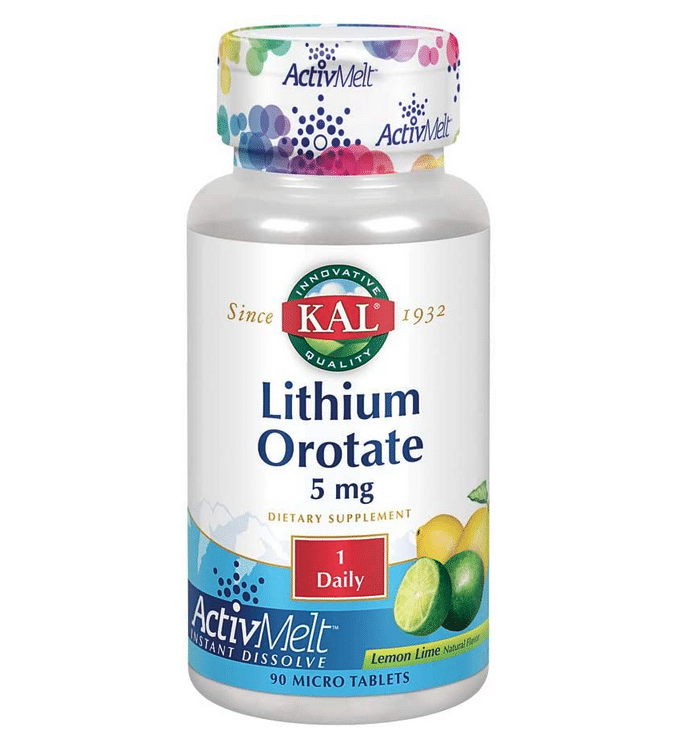
KAL has been around since 1932, so they have a long history of creating quality supplements. The company is transparent about its manufacturing practices, and its products are tested by independent labs.
KAL sources raw ingredients internationally but performs regular testing in their manufacturing facility in Utah to ensure they always meet high-quality standards.
Swanson
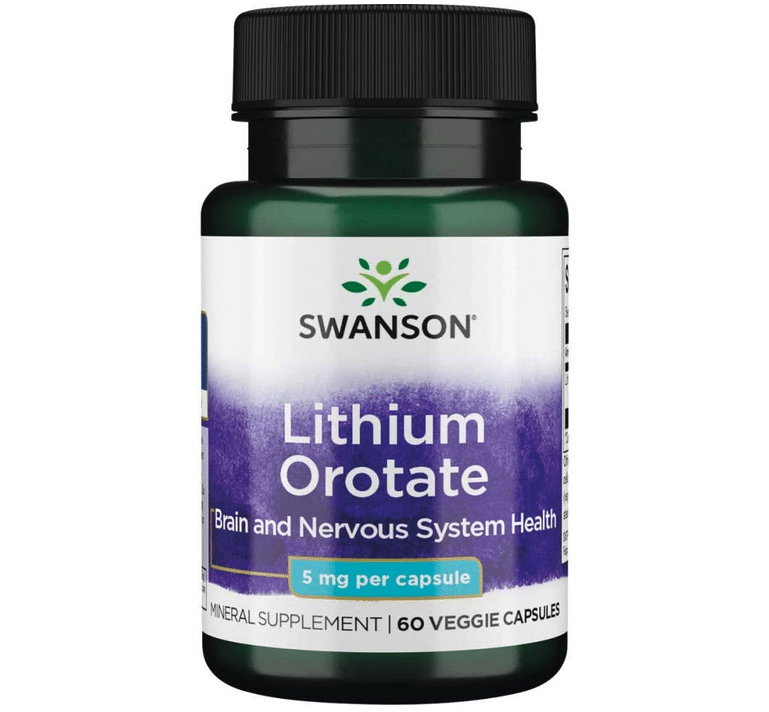
Swanson has been in the supplement industry for over 40 years, and they’ve become a very reputable brand. They are completely open about their practices and participate in third-party lab testing voluntarily. Swanson holds all the right certifications, and their manufacturing facilities are GMP-certified.
Life Extension
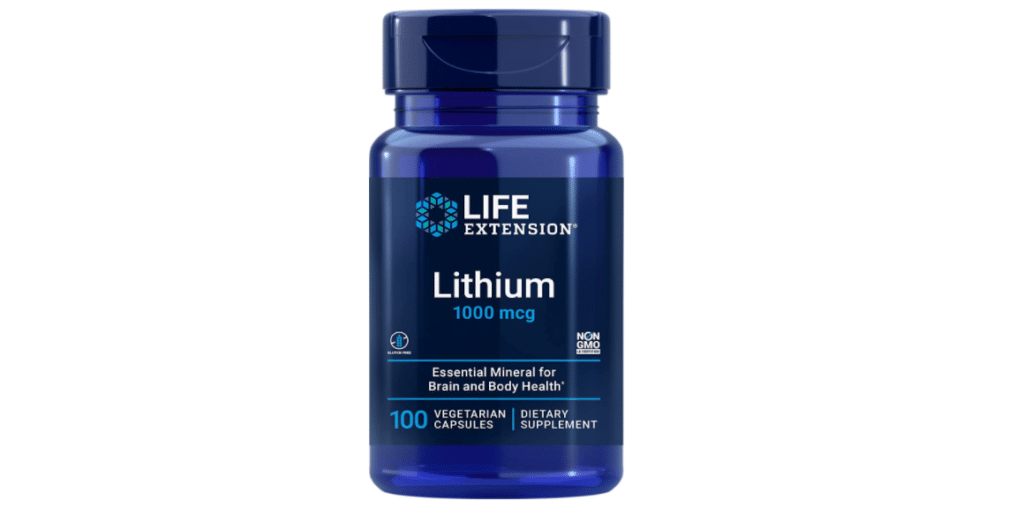
Life Extension has over 40 years of experience formulating high-quality supplements. They focus on following and creating the latest nutritional research to develop products that improve different aspects of your well-being.
Although they source ingredients internationally, they manufacture their products in the US following strict production, safety, and purity procedures. The company is transparent about its practices, and its products are third-party lab tested.
Pure Encapsulations
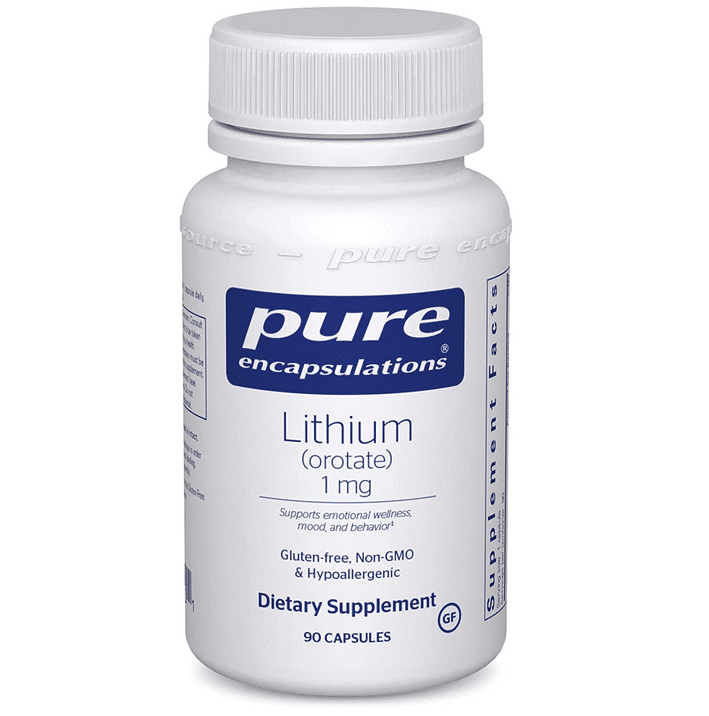
Although their lithium orotate supplement is relatively new on the market, Pure Encapsulations is well-known for researching and developing premium quality supplements. They have over 30 years of innovation, and it subjects all of their formulations to rigorous testing for efficacy and safety.
The products by Pure Encapsulations are free of most allergens, and they are transparent about ingredient sourcing and manufacturing practices.
Weyland Brain Nutrition
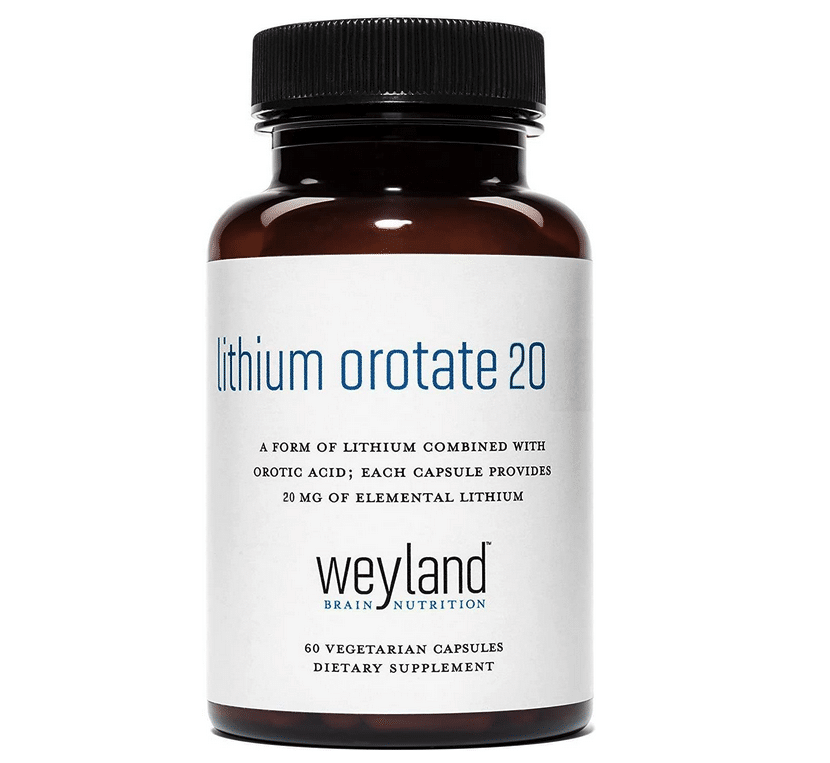
Weyland is a relatively new brand in the supplement market, and they focus on creating products that promote brain health. They manufacture their products in the US, and everything is quality-tested by third-party labs.
There is a lack of information on the company history, founders, and their background. Still, their products continuously receive good reviews, which is why we’ve decided to put Weyland Brain Nutrition on the list.
Lithium Orotate FAQs
What is the maximum dosage of lithium orotate?
The highest lithium content we found in a lithium orotate supplement is 20 mg. However, the maximum lithium dosage we recommend is 5 mg per day. Going over this limit should be done only in consultation with a medical professional.
How long does it take for lithium orotate to start working?
Since lithium orotate is a low-dose lithium supplement, you will probably need to take it for 3-6 weeks before experiencing a full spectrum of benefits. Some people claim to feel the effects in the first days after taking this supplement, but most experts agree that you need at least two weeks before seeing the benefits.
Where can I get lithium orotate?
Lithium orotate is an OTC supplement, so you can get it at places that sell these types of products. However, the best way is to order it from Amazon, as there you can quickly check for credibility factors for both the product and the manufacturer.
How much lithium orotate should I take from depression?
Depression is a serious condition that requires help from a qualified professional. You should consult with a psychiatrist before starting or changing your treatment. With that in mind, lithium orotate may be a good way for the long-term management of depression symptoms. Talk to your psychiatrist and work out your dosage and treatment plan.
Can I take lithium orotate along with antidepressants?
No, you should never take lithium supplements with antidepressants. Lithium orotate increases serotonin levels, as do antidepressants. As a result of too much serotonin, you can experience severe side effects such as anxiety, tremors, and heart problems.
Does lithium orotate help you sleep?
Yes, many people report better sleep when taking lithium orotate. Studies report that people with bipolar disorder taking lithium experience better sleep quality and longer sleep duration. It seems like they spend more time in the slow-wave phase, also known as deep sleep. That is essential for feeling well-rested the following day.
How does lithium orotate work?
Lithium affects neural pathways and changes the release of chemicals in your central nervous system. It helps to improve and balance mood, and it also has neuroprotective properties. Although doctors still don’t know the exact mechanisms, lithium seems to strengthen connections between neurons in the brain.
How long does lithium orotate stay in your system?
Lithium is not metabolized, and it has a half-life of around 24 hours. That means that your kidneys get rid of it within 48 hours. That’s why it is crucial to be consistent with lithium orotate supplements if you want to feel the benefits continuously.
Can you overdose on lithium orotate?
Yes, taking too many lithium orotate supplements can lead to lithium toxicity and negative consequences. That includes diarrhea, vomiting, tremors, stomach pains, drowsiness, and more. Severe toxicity can lead to seizures, kidney failure, confusion, coma, and even death. So, make sure to follow the intake instructions and don’t go over 5 mg of lithium per day unless your doctor told you to do it.
Is lithium orotate the same as lithium?
Lithium is unstable in its elemental form, so it needs to be in the form of salt for supplement manufacturing. So, you are taking lithium orotate for the benefits of lithium. However, lithium orotate has some advantages over other lithium salts, such as the ability to cross the blood-brain barrier more easily.
How much lithium orotate should I take?
You should take between 26-131 mg of lithium orotate, which contains 1-5 mg of elemental lithium. This appears to be the optimal range to experience maximum benefits and avoid those side effects associated with higher lithium intake. We suggest consulting with a medical professional before going over this dose.
Is lithium orotate safe?
Yes, lithium orotate is safe when you follow our recommended dosage of 26-131 mg of lithium orotate per day. That way, you can minimize the chances of side effects such as weight gain, heart palpitations, or fatigue.
Looking To Buy Lithium Orotate? Check Out Our Review On The Best Lithium Orotate Supplements

Read our review of the best lithium orotate supplements here.
Studies You Can Read About Lithium Orotate
- Lithium orotate: A superior option for lithium therapy? (Brain and Behavior, 2021)
- Medication-free Alternatives for Long-term Maintenance of Bipolar Disorder: A Case Series (Global advances in health and medicine, 2015)
- Influence of lithium on sleep and chronotypes in remitted patients with bipolar disorder (Journal of affective disorders, 2016)
- Lithium increases slow wave sleep: possible mediation by brain 5-HT2 receptors? (Psychopharmacology, 1989)
- Chronic Microdose Lithium Treatment Prevented Memory Loss and Neurohistopathological Changes in a Transgenic Mouse Model of Alzheimer’s Disease (PloS one, 2015)
- A randomized, double-blind, crossover study of methylphenidate and lithium in adults with attention-deficit/hyperactivity disorder: preliminary findings (The Journal of neuropsychiatry and clinical neurosciences, 2002)
- Is there a role for lithium orotate in psychiatry? (Australian & New Zealand Journal of Psychiatry, 2018)
- Lithium in the episode and suicide prophylaxis and in augmenting strategies in patients with unipolar depression (International journal of bipolar disorders, 2017)
- Lithium versus antidepressants in the long-term treatment of unipolar affective disorder (Cochrane Database of Systematic Reviews, 2006)
- Lithium ameliorates autistic-like behaviors induced by neonatal isolation in rats (Frontiers in behavioral neuroscience, 2014)
- Revisiting Lithium: Utility for Behavioral Stabilization in Adolescents and Adults with Autism Spectrum Disorder (Psychopharmacology bulletin, 2019)
- Lithium: a potential therapeutic strategy in obsessive–compulsive disorder by targeting the canonical WNT/β pathway (Translational Psychiatry, 2021)
- A randomized, double-blind, crossover study of methylphenidate and lithium in adults with attention-deficit/hyperactivity disorder: preliminary findings (The Journal of neuropsychiatry and clinical neurosciences, 2002)
- Lithium orotate in the treatment of alcoholism and related conditions (Alcohol, 1986)
- Lithium in migraine and cluster headache: a review. (Journal of the Royal Society of Medicine, 1981)
- Clinical and biological effects of long-term lithium treatment in older adults with amnestic mild cognitive impairment: randomised clinical trial (The British Journal of Psychiatry, 2019)
- Neuroprotective Effects of Lithium: Implications for the Treatment of Alzheimer’s Disease and Related Neurodegenerative Disorders (ACS chemical neuroscience, 2014)
- Lithium side effects and toxicity: prevalence and management strategies (International journal of bipolar disorders, 2016)
- Long-term, low-dose lithium treatment does not impair renal function in the elderly: a 2-year randomized, placebo-controlled trial followed by single-blind extension (The Journal of clinical psychiatry, 2014)
- Chronic lithium toxicity (Toxicological reviews, 2006)
- Lithium orotate in the treatment of alcoholism and related conditions (Alcohol, 1986)
- Lithium toxicity from an Internet dietary supplement (Journal of Medical Toxicology, 2007)
- Lithium Use in Pregnancy and the Risk of Cardiac Malformations (New England Journal of Medicine, 2017)
- A systematic review of the effect of L-tryptophan supplementation on mood and emotional functioning (Journal of dietary supplements, 2021)
- Low plasma GABA is a trait-like marker for bipolar illness (Neuropsychopharmacology, 1993)
- Neurotransmitters as food supplements: the effects of GABA on brain and behavior (Frontiers in psychology, 2015)
- Taurine and its analogs in neurological disorders: Focus on therapeutic potential and molecular mechanisms (Redox biology, 2019)
- Lithium: occurrence, dietary intakes, nutritional essentiality (Journal of the American college of nutrition, 2002)
Editor’s note: we are regularly updating this review. If you see any problems, weird interpretations of the data, or just want to say hi, please reach out to hello@the-unwinder.com.
Photo by Towfiqu Barbhuiya on Unsplash
